|
|
|
|
Highlander, all terms and photos,
copyright by Rysher Entertainment
White Wolf, World of Darkness, all terms
copyright by White Wolf Inc.
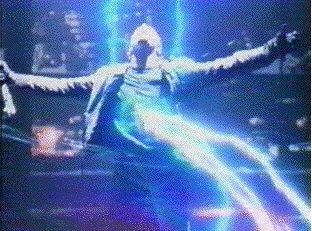 CHARACTER CREATION - "I am Immortal/I
have inside me blood of kings/I have no rivals/No man can be my equal..." --
Queen; Princes of the Universe
CHARACTER CREATION - "I am Immortal/I
have inside me blood of kings/I have no rivals/No man can be my equal..." --
Queen; Princes of the Universe
The basic rules for my version of Highlander: the Gathering are the same as any White Wolf system. To make things easier, the only information presented here is new information -- the specific stuff you need to know to create and play Immortals in the White Wolf system. I've assumed you know what you need to know about the Highlander story to fill in those details -- these are mostly just straight rules.
IMMORTAL CHARACTERS HAVE:
Attributes: 7/5/3, Abilities: 13/9/5,
Backgrounds: 5, Foci: Sense Quickening of one dot, Willpower: 5, Mortality: 5,
Quickening: 3, Virtues (Conscience, Courage & Self-Control; all start with
one dot, as Attributes do): 7, Freebees: 15
Available
Abilities: Choose any from the books, except those an Immortal could
never have (such as Rituals for Garou). If you need other Abilities due to your
chraracter's bizarre history, check with the Storyteller and make them
up.
Available Backgrounds: Resources, Contacts, Allies,
Mentor (rank determines the age of the mentor; each dot represents about 500
years), Fame, Clan (a mortal family you can connect to throughout the years),
Age (see below; PCs can't have over 5 dots)
Available Foci
(note that the activation of any Focus power requires the expenditure of one
Quickening point, whether the roll for the power is successful or not) -- this
list can be freely added to with agreement between player and GM; several
Vampiric Disciplines, such as Dominate, for example, make good Foci:
All sensations are based on disruptions in the "life web" around the Immortal, which is why even undead can be sensed. A sense of nausia and increased awareness is the core of the experience. The range of all sensations is 100 yards. A failed roll is simply a failure, but a botch means the character receives false information based on a poor reading of the "life web."
Effects of the Age Background: every point adds a century onto the amount of time the character has lived through. No points mean that the character is a relatively young immortal -- reborn within the 20th century. Each of these points also adds 5 freebee points, reduces Mortality by 1, and allows a greater number of loose contacts and associations within Immortal society.
Here are the Freebee costs for certain traits:
|
TRAIT |
COST |
|---|---|
|
Attribute |
5 |
|
Ability |
2 |
|
Background |
1 |
|
Focus |
3 to raise, |
|
Quickening |
2 |
|
Mortality |
2 |
|
Virtues |
2 |
|
Willpower |
1 |
RULES & SYSTEMS - "I'll be the judge of that..." -- Kane
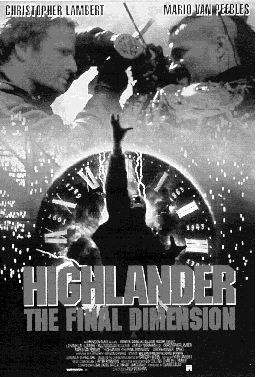 Mortality operates much like Humanity does for
vampires. The total of a character's Virtues is dependant his Mortality score.
If the Stoyteller deems that a point of Mortality is lost during the course of a
story, the player must make one roll on each Virtue, difficulty 8. Any botches
result in that Virtue being decreased by one. Characters can roll Conscience
checks to avoid losing points in Mortality -- this means they feel remorse for
their actions. The difficulty for such a roll is 7 (or higher, depending on the
severity of the act). Below is a basic personality description for the range of
Mortality scores.
Mortality operates much like Humanity does for
vampires. The total of a character's Virtues is dependant his Mortality score.
If the Stoyteller deems that a point of Mortality is lost during the course of a
story, the player must make one roll on each Virtue, difficulty 8. Any botches
result in that Virtue being decreased by one. Characters can roll Conscience
checks to avoid losing points in Mortality -- this means they feel remorse for
their actions. The difficulty for such a roll is 7 (or higher, depending on the
severity of the act). Below is a basic personality description for the range of
Mortality scores.
|
MORTALITY SCORE |
MODIFICATIONS & NOTES |
|---|---|
|
10 |
Saintly disposition -- compassionate and pacifistic |
|
9-6 |
Average |
|
4-5 |
Seen as a bit odd or arrogant, but still definitely human. |
|
3 |
Aloof and often haughty. Gregor, an Immortal from the series, was like this. Sometimes toy with mortals -- curious about things like fear and pain. |
|
2 |
Manipulative and cruel. Frequently uses humans as pawns or even playthings. Mortals tend to shy away from you. |
|
1 |
Think of Kurgan -- loathsome and brutal, seeing mortals as no more than objects for entertainment. Will, however, maintain the tenets of Immortal law. |
|
0 |
Totally inhuman -- worse than Kurgan. Rarely speak to or acknowledge mortals. Cares nothing for maintaining the secrecy of the immortals, and is thus hunted by all. |
The costs for advancing abilities and the like change after character
creation. The prices are listed below.
|
TRAIT |
COST |
|---|---|
|
Attribute |
Current x4 |
|
Ability |
Current x2, New Ability costs 3 |
|
Focus |
Current x3, New Focus at 1 dot costs 7 |
|
Quickening |
Special -- see below |
|
Mortality |
Only advances through role-playing |
|
Virtues |
Current x2 |
|
Willpower |
Current x1 |
Quickening can only be raised with temporary Quickening, which is gained solely by beheading other immortals. Ten temporary points become one permanant point. These temporary points can be used like any Quickening points, but temp. points so used are erased (success or not).
Attributes and Abilities may go over the standard limits of 5, but the experience costs are much higher: current rating x6 for Attributes and current rating x4 for Abilities. The player must also give the Storyteller a good rationale for the supernatural advancement.
SWORD COMBAT - "How do you fight such a savage?" "With heart, faith, and steel..." -- Connor MacLeod and Ramirez
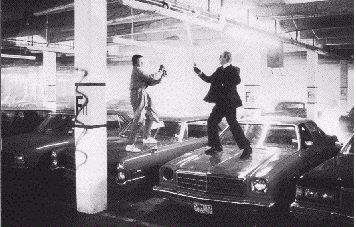
John Gavigan recognized the need for some advanced fighting techniques and wrote the following:
"To reflect the complexity of sword combat, and the fact that it's not just a case of hacking at the other person until one of you dies, I have adopted the following list of standard sword-fighting maneuvers from the rules for Klaive-duelling in the Werewolf Players Guide. They are split up into two types - Attack maneuvers and Defense maneuvers. Normally, the attacker will choose an Attacking maneuver, and his opponent will choose a Defense maneuver, in an attempt to counter it, but in some cases, the nature of the Attack maneuver will only allow the defender one option. For example, if an attacker decides to try and disarm his opponent, his opponent must decide to try to hang on to his weapon. He has no other choice."
The Gavigan list, with additions
IMMORTALITY - "It's a kind of magic." -- Connor MacLeod
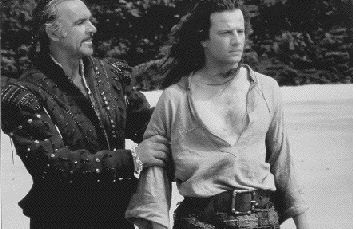
Being Immortal doesn't simply mean living forever. That is certainly part of it, but the deal is far more complex than that.
First of all, Immortal's are exceedingly healthy and able-bodied, to the
point that they can regenerate. Immortals heal Health Levels according to this
table (only when they are at rest!), and the times are cumulative:
|
HEALTH LEVEL |
TIME TO HEAL |
|---|---|
|
Bruised |
One Round |
|
Hurt |
One Round |
|
Injured |
Two Rounds |
|
Wounded |
Two Rounds |
|
Mauled |
Three Rounds |
|
Crippled |
Four Rounds |
|
Incapacitated |
Five Rounds |
This includes "negative" health levels, as severe, "killing" damage will only send the immortal into suspended animation until he can heal up to at least 1 positive health level (each negative level takes one round to heal). Alternately, the immortal can spend Quickening to heal some levels instantly (one level per point). Aggravated damage, however, cannot be healed in this fashion -- you just have to wait it out. Also, to heal from the damage level to perfect health, you must remain uninjured during the required time. If, for example, your character is Bruised, he will heal in one round. However, if, during that round, he is struck again and suffers two more levels of damage, he does not heal that Bruised level -- he is at the Injured level, and must wait three full rounds to heal to pristine condition.
Immortals are immune to diseases and illness -- they don't catch colds, although they may periodically pretend to, so as to maintain their secrecy. Similarly, they cannot be killed by deadly poisons. Knock-out gasses and the like will affect them, but an Immortal can guzzle a glass of cyanide-tainted wine and suffer only the standard incapacitation and rebirth. Note, however, that Immortals can get drunk (and often do).
This isn't to say that Immortals don't feel pain. Indeed, it is the intense pain of death and rebirth that keeps an Immortal from tossing himself to the winds of fate on a regular basis -- only in the most desperate situations will an Immortal allow himself to "die."
In game terms, an Immortal "dies" when his health level is reduced to zero or less (as do mortals). Once this point is reached, the Immortal falls into a state of suspended animation -- there is no heartbeat, no brainwave activity. He is, for all medical purposes, deceased. In actuality, however, this state is one of increased healing. It takes quite a bit of energy for an Immortal to be "reborn," and the physical body must be completely shut down so that the power of the Quickening can regenerate damaged tissue. Health levels are restored as previously noted, no matter how much damage is incurred -- some Immortals have been out for so long that they find themselves on the autopsy table when they come to.
The only true way to destroy an Immortal is to remove his head from his body -- to sever his mind from his heart, these two organs being the pillars of an Immortal's connection to the Quickening, which is described below. Decapitation is the quickest and surest way of killing an Immortal, although other methods that destroy the connection between head and heart can and do work. Extreme heat (and I mean extreme), for example, will eventually kill an Immortal, if he allows his head to be burnt to ashes. Either of these organs can be damaged, but if either are completely destroyed or separated from the other, then the Immortal thus afflicted will die.
THE QUICKENING - "Feel the power of the Quickening!" -- Ramirez
The Quickening is the term used to describe the connection that all Immortals have to the pulsating, rhythmic ebb and flow of life around them. They draw from and revel in the power given by pure, raw life energy.
This connection gives Immortals some super-human abilities, some of which are known as Foci. The most common Focus is the ability to sense the presence of other Immortals (Sense Quickening). Immortal life-force is strong, and radiates a distinct aura that only other Immortals can recognize (although other supernatural types may be able to see it, they can't identify it). When an Immortal senses another of his kind, he feels a slight queasiness in the stomach and a heightened perception of the environment around him -- the life-forces of the two Immortals are reacting with one another. The radius of this effect is roughly 100 yards in all directions, regardless of physical obstacles. There is no way to block or falsify this sensation, although it will settle down with prolonged exposure to a specific Immortal (you can hang out with an Immortal and not throw up every ten minutes).
The Quickening is the means by which an Immortal is immortal. At some time in his past, he had an encounter which ended his mortal life. A short time thereafter, usually a few hours later, he was reborn. From that point onward, he was destined (some say doomed) to live forever. Newly reborn Immortals are disoriented, shaken, and very confused. This is the time when many are cut down -- other Immortals can sense them, and the life-force of someone just reborn is high. Many are the Immortals who never got a chance to taste immortality because they were too slow and too confused.
Immortals never age from the point at which they first become immortal. Their organs and muscles work just as well 500 years as 50 years from the day of their rebirth. Up until the point that an Immortal meets his first physical death, he will age, get sick, heal and be injured as if he were a mortal. In fact, Immortals must be born to mortal parents, as all Immortals are, paradoxically, sterile.
THE QUICKENING RATING - "The Quickening! The Quickening has hold of me! I know everything! I am everything!" -- Connor MacLeod
Quickening is an extremely vital Advantage. It is used in many ways, which are listed below.
One point of Quickening spent will:
Quickening points spent to do any of these things are not lost -- they regenerate to full at the end of the scene. Quickening is also used (after dividing in two and rounding down) to compare Ranks/Discipline/Sphere, etc. with other supernaturals.
 THE PRICE OF IMMORTALITY - "Live
forever... But I feel so dead inside. Are you dead inside MacLeod? Are you dead?
Or are you alive?" -- Annie Devlin to Duncan MacLeod
THE PRICE OF IMMORTALITY - "Live
forever... But I feel so dead inside. Are you dead inside MacLeod? Are you dead?
Or are you alive?" -- Annie Devlin to Duncan MacLeod
Immortality isn't all sweetness and light. Living forever carries a heavy burden. Imagine watching all of your loved ones grow old, infirm, and weak. Imagine watching them all die while you go on living. Now imagine that happening again... And again... And again... How human are you? Are you human at all?
This is the sort of pain Immortals must deal with. For some, their pain becomes a tragic reminder of the importance of life, its passions, values, and frailty. For many, however, it only means insanity -- dehumanization as a result of losing one's connection to mortality.
ORGANIZATIONS AND STRUCTURES - "No one has ever known we were among you. . . until now. . ." -- Introduction to The Highlander
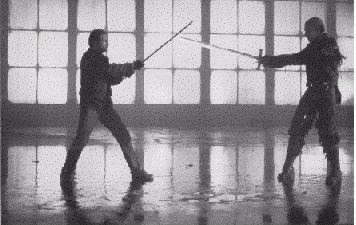
THE GATHERING AND THE PRIZE - "From the dawn of time we came, moving silently down through the centuries, leading many secret lives. Struggling to reach the time of the Gathering, when the few who remain, will battle to the last." -- Ramirez
The life-forces of Immortals are tied to all living things through the Quickening. This connection includes other Immortals, a fact which has given rise to something known within Immortal society as the Gathering.
The Gathering refers to a time when the surviving Immortals of the world will be drawn together to fight for the Prize. The Prize is power -- the accumulated life-forces of all Immortals who ever lived. No one knows exactly what form the Prize will take, except that it will rise its possessor to a state of near god-hood. In the hands of a good Immortal, this could be bliss. In the hands of a corrupt Immortal, this would mean terrible things for the world of mortals at large.
Many believe that the Gathering is just now beginning -- Immortals are "bumping" into others of their kind more and more frequently. Sometimes the results are violent and bloody Duels, which follow a precise and strict set of laws that have been followed, like all the other rules of the Gathering, for as long as can be remembered.
"On the other hand, it may well be that the legend of the Prize is simply a tale, and that the Gathering will never take place. Perhaps, new immortals will continue to be born forever, thus ensuring that there will never be a single victor. In any case, for Immortals, the Gathering is similar in many ways to the Apocalypse for the Garou, or Gehenna for the Kindred - a fate that no one really believes in , or as some Garou might say, something that will never happen "in our lifetime". The big difference for immortals is that a lifetime can last forever. To an immortal, it matters little whether the Prize is but a legend. He must battle on, for if he stops, he will surely lose his head." -- Hank Driskill and John Gavigan.
There are only a few hundred total Immortals world-wide. Because of this, most of them are familiar with or have at least heard of the others. Only the youngest or most secretive Immortals are unknown.
THE RESULTS OF A DUEL - "One dream/One soul/One prize/One goal/One golden glance/Of what should be." -- Queen; A Kind of Magic
When any Immortal kills another of his kind in a Duel, he absorbs the life energy and vital memories of his opponent. This is a painful and violent process, wherein the energy writhes and plays about the area, smashing windows and wreaking havoc on electrical devices before it is finally drawn into the victorious Immortal. In game terms, the victor gains all of the loser's remaining Quickening points as temporary additions to his own attribute. 10 temporary points equal one permanent point.
In addition, the victor gains as many Ability points as the loser had in total permanent Quickening. These points are to be spent immediately, and only on those Abilities the loser had which were greater than the winner's own.
The ettiquette of the Gathering prohibits any Immortal from attacking another while he is incapacitated by this process or its aftermath -- a period of pain which lasts for a few minutes following the event.
THE LAWS OF THE GATHERING
Observed by all but the most vile Immortals, the laws of the Gathering have been in place for centuries:
A NOTE ON HOLY GROUND - "None of us will violate that rule -- it's tradition." -- Ramirez
Because this particular rule has been followed for so long, all immortals have the innate ability to sense when they are standing on holy ground. The term "holy ground" is not limited to what one individual deems holy -- all holy areas are recognized. Like Ramirez said: "it's tradition." This isn't a tradition that is often broken, either -- in fact, only one, Kane, has ever tried to take another immortal's head on holy ground. He failed. There seems to be something about holy lands that almost actively resists this blasphemy.
THE LAW OF SECRECY
This is mainly an unspoken law, and exists for the safety of the Immortals. They know that, while they may be much more powerful than mortals, they are not invulnerable. If mortals were to find out about them en masse, the results could be disastrous for them, with witch-hunts and other such terrors abounding. Some Immortals have been known to reveal their secret to those closest to them, but only if they either have no choice, or trust the mortal completely.
MENTORS - "You're too late, Kurgan. I have prepared him for you..." -- Ramirez
Most Immortals are found by another of their kind just following their first death. These Immortals become mentors and teachers for the newly reborn Immortals. They describe the prizes and prices of immortality and the laws of the Gathering.
The mentor-pupil bond is a strong one, and the two Immortals usually become friends for life (which, for Immortals, is a very long time). Mentors can provide a basis of support for young Immortals who have been forced to leave their friends and family behind as a result of their change.
However, despite this strong bond, there comes a time when the mentor and student must separate. This time is usually marked by the new Immortal's first Duel. Some mentors have even been known to force their pupils to Duel (and slay, if they can) them as a rite of passage. When the time for separation comes, the young Immortal must leave to seek out his fate in the world. There are no exceptions.
Some famous mentor-student relationships include: Ramirez and Connor, Connor and Duncan, Duncan and Richie.
THE WATCHERS - "He is Immortal, and he is not alone..." -- Joe Dawson
A recent revelation to a very small number of Immortals has been the discovery of the Watchers. This secret society of mortal scholars and their aides have been recording the lives of the Immortals for centuries. They know almost everything about almost every Immortal in existence. Their storerooms are filled with record books and ancient artifacts relating to the Immortals.
Like any good secret society, the Watchers are elusive to the extreme. The best proof of this fact is that only a handful of modern Immortals have been able to learn of their presence. Immortals who suspect Watcher activity may return to the suspected location for investigation, only to find all traces of habitation vanished without a trace.
The Watchers are both scholars and spies. They plant men in jobs and positions which are advantageous to their pursuit. The scholars then record and compile the information they receive from the spies in massive data-banks. It is because of the Watchers' distribution and efficient placement that Immortals can Duel and take an opponent's head without feeling the full measure of mortal law come down on them (although most Immortals are unaware of this -- they just assume that they were skilled enough to cover their tracks).
Not all Watchers are non-partisan observers, however. More and more modern Watchers are becoming corrupted by fear and greed. They believe that the Immortals are fighting for the right to rule mortal man-kind. They despise all Immortals and will trust none. Some even believe that if they do enough research and kill enough Immortals, that they themselves can find a way to receive the Prize. These men and women compose a definite threat to all Immortals -- they are the Hunters.
Watchers can be identified by a small blue tattoo worn on the wrist. If asked about these tattoos, Watchers often make excuses such as "I got it with my squad back in 'Nam," or "I'm a Shriner." Note that the Watchers and the Arcanum are two different groups. Whether or not the one has anything to do with the other is entirely up to the Storyteller.
THE WORLD OF DARKNESS - "Forgive me, father; I am a worm..." -- Kurgan
 In relation to other White Wolf characters, a few
notes are in order. Immortals are immune to the Delirium -- their confidence in
eternal life, plus their separation from normal humans has prevented the
Delerium form being imprinted into their "blood." And speaking of blood, due to
the power of the Quickening, Vampires find that Immortal blood is very useful.
In fact, Immortals have the standard human blood points of ten, plus their
current Quickening score in points.
In relation to other White Wolf characters, a few
notes are in order. Immortals are immune to the Delirium -- their confidence in
eternal life, plus their separation from normal humans has prevented the
Delerium form being imprinted into their "blood." And speaking of blood, due to
the power of the Quickening, Vampires find that Immortal blood is very useful.
In fact, Immortals have the standard human blood points of ten, plus their
current Quickening score in points.
In regard to Mages, perhaps Hank Driskill's and John Gavigan's notes on Quickening in the World of Darkness are in order:
"The Quickening is...similar to Quintessence, the magical "raw power" that fuels Patterns and also is used by Mages to do their magick. Only when [immortals] die is their Quickening released. Mages cannot pull Quickening from an immortal, nor can they alter an immortal's Pattern in any way. Without their Quickening, an immortal is nothing, It is what keeps them alive. The total loss of Quickening is directly related to death. When an immortal dies, it is not because his head is no longer attached to his shoulders - it is because he has lost his Quickening. Mages hold Quintessence within their bodies because of their Avatar."
Also:
"To the supernaturally-trained eye, immortals will often be confused with Mages: they have an excess of raw energy within them. The Garou likewise store mystical energy within them, according to their Gnosis. Immortals are therefore occasionally mistaken for Garou as well... Much like Vampiric disciplines, Garou gifts, or a Mage's spheres, Quickening allows immortals to perform superhuman feats. The higher the immortal's Quickening, the more abilities he has and the more powerful he becomes."
And in regard to Wraiths and others who can affect the "soul" or mind of another:
"An immortal's mind, spirit, and body are tightly held by their Quickening. Although mind effects (the Mind sphere, Dominate, or Presence) may affect the immortal, his mind cannot be pulled from his body, nor may his spirit be removed without his head being removed first. This is not a contested roll, this is automatic. It should be noted...that because of the manner in which the Quickening binds an immortal's being together, Immortals cannot be possessed."
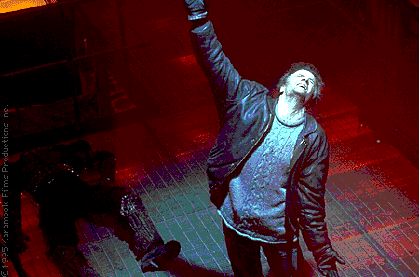
"Who wants to live forever,/Who wants to live forever,/Forever is our's today,/Who waits forever anyway?" -- Queen; Who Wants to Live Forever?
![]()